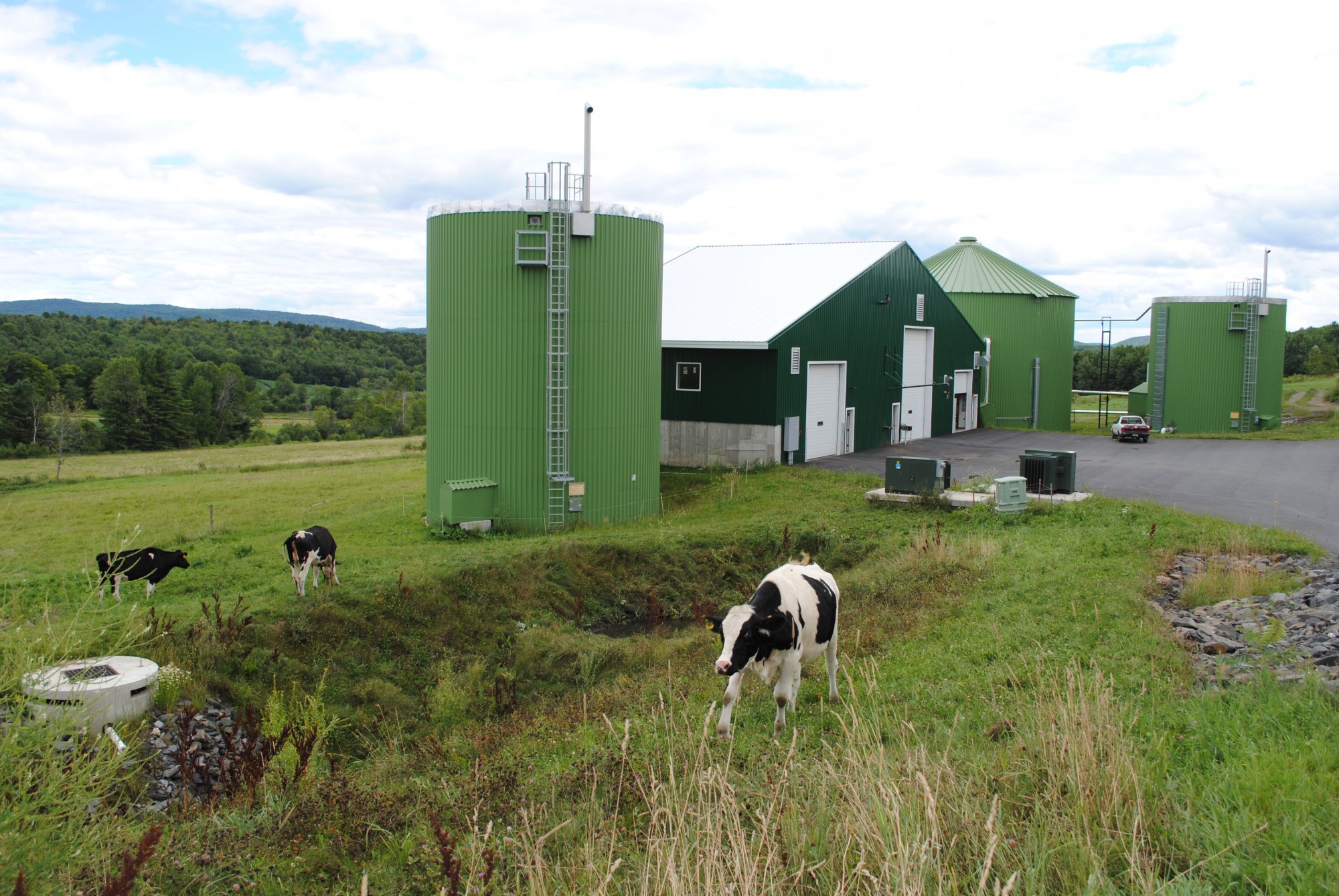Community scale biodigester demonstrates renewable energy, waste reduction, and nutrient management in Vermont
July 08, 2016

“Big Bertha,” the anaerobic digester at Vermont Technical College, is operating at full capacity and successfully putting electricity onto the grid. With a carefully formulated diet of cow manure and organic matter from Vermont farms and brewery waste from the Alchemist and Long Trail Brewing Co., at full power Big Bertha transforms 16,000 gallons of waste to 8,800 kilowatt hours of electricity daily—equivalent to about 200 gallons of heating oil, or the amount of electricity consumed by about 70 houses on a cold day.
“One of only a handful of anaerobic digester projects of its kind in the country, Big Bertha provides electricity for the grid, a living laboratory for students, and recycled nutrients for agriculture,” notes Vermont Tech President, Dan Smith. “This project embodies Vermont Tech’s unique combination of education theory and applied learning.”
The biodigester serves as a real world classroom providing students and the community with hands-on emerging technology training. Vermont Tech has created curriculum, an apprenticeship program, and integrated the biodigester into the college’s renewable energy Bachelor Degree program. Big Bertha also produces clean animal bedding and crop fertilizer output for Vermont Tech’s farms and fields.
Vermont Tech and project partner Vermont Sustainable Jobs Fund published the Vermont Tech Community Anaerobic Digester Report, a collection of digester manuals and management plans, timeline and process, and data collection systems so colleges and municipalities across the country can replicate the community scale anaerobic digester model.
“As communities in areas with impaired watersheds consider how else they might manage excess nutrients and keep food residuals out of landfills, as well as explore ways to produce more of their own electricity from renewable sources, a community scale anaerobic digester may be a viable scenario,” says Vermont Sustainable Jobs Fund Executive Director, Ellen Kahler.
With funding from the U.S. Department of Energy that was secured by U.S. Senator Patrick Leahy and managed by the Vermont Sustainable Jobs Fund, along with a bond from the Vermont State Colleges, the total cost of the Vermont Tech biodigester project was $4.2 million.
“This digester project has fulfilled exactly what I hoped would be accomplished when I sought the funding,” said US Senator Patrick Leahy. “It is a true research digester, and Vermont Tech and the Vermont Sustainable Jobs Fund have put together a project that will add greatly to our knowledge of how to build and operate digesters at this scale, while giving Vermont Tech students first-hand experience with the technology, experience that can’t be matched by much larger research universities.”
Vermont Tech took on calculated risk in both permitting and technology to become fully operational. The biodigester was the first in Vermont to go through a permitting process to accept food waste. Vermont Tech conducted comprehensive community outreach and engagement to build support for the project and successfully connected education, agriculture, waste management, and environment interests to get behind the project. They also facilitated collaboration among state and federal regulators, food system organizations, farmers, and food waste producers. Big Bertha is modeled after European technology, and is a U.S. Environmental Protection Agency AgSTAR partner, which recognizes biogas recovery systems that “help to reduce methane emissions and can also help achieve other social, environmental, agricultural and economic benefits.”
Big Bertha is also helping Vermont reach its ambitious goals of 90% renewable energy by 2050. In addition, as Vermont’s Universal Recycling Law (Act 148) ramps up to ban food and organic waste from landfills by 2020, Vermont Tech and its food waste transportation partners will become integral to help divert organic waste from landfills, prevent the flow of excess nutrients to Lake Champlain and other watersheds, and supporting agriculture and increased local food production.
###
About Vermont Tech – Vermont Tech is a leading public college with a mission of applied education. One of the five Vermont State Colleges, Vermont Tech serves students from throughout Vermont, New England, and beyond at its two residential campuses in Williston and Randolph Center, regional campuses in Brattleboro and Bennington, and at five nursing campuses located throughout the state. Vermont Tech takes an optimistic, rooted and personal approach to education to support students in gaining the confidence and practical skills necessary to not only see their potential, but to experience it. Our academic programs encompass a wide range of engineering technology, agricultural, health, and business fields that are vital to producing the knowledgeable workers needed most by employers in the state and in the region. www.vtc.edu.
The Vermont Sustainable Jobs Fund (VSJF), located in Montpelier, Vermont, is a non-profit organization created by the Vermont Legislature in 1995 to nurture the sustainable development of Vermont’s economy. VSJF provides business assistance, network development, research, and financing in agriculture and food system, forest product, waste management, renewable energy, and environmental technology sectors. www.vsjf.org




